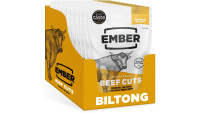

People with fast metabolism often struggle with bulking up and gaining muscle mass. It often seem that the answer to 'how to gain weight and bulk up' naturally is not as easy as 'just eat more'. Indeed, if you want to gain mass quick, you will need to have a look at these mass gaining tips now.
Many people struggle with putting on weight and muscle, mostly young men, who think that by only eating twice as much as they usually do will do the trick. Eating more than usual will certainly help the process, but there are other key factors you have to take into account if you want to gain weight and muscle.
Admittedly, 'how to gain weight' is not as popular of a topic as 'how to lose belly fat', yet there are still quite a few people who struggles to increase muscle mass, regardless how much they eat. Not being able to put on weight can be just as frustrating as trying to lose weight, but following our handy weight gain tips, you can nudge your metabolism in the right direction.
- Mike Tyson bodyweight workout
- Get a full body pump in 15 minutes using dumbbells
- The kettlebell get up is a one-move full body workout

The basic concept is fairly straightforward: in order to gain weight, you need to maintain a positive energy balance by supplying your body with more calories than you expend through simply existing and exercising/moving around. The actual process can be a bit more nuanced than this and might involve close monitoring of food intake and tracking workouts too. This is not necessary, though.
Here, we'll share some tips that might help you get out of the weight gain rut and put you on the fast track of gaining muscle mass. Some of them will be related to nutrition – of course – but if you would like to gain weight the right way and also build muscle in the process, you will have to pay attention to your workout regime as well.
IMPORTANT: If you are underweight, have any underlying medical conditions or eating disorders, please consult your doctor first before you apply any changes to your diet. The below tips are more suited for people with fast metabolism who are otherwise healthy and by no means to be taken as medical advice.
Sign up to the T3 newsletter for smarter living straight to your inbox
Get all the latest news, reviews, deals and buying guides on gorgeous tech, home and active products from the T3 experts
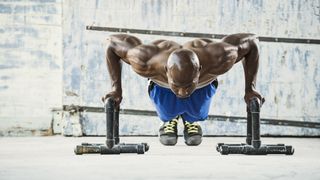
Why am I not gaining weight?
The main reason why many people fail to bulk up and gain weight is the lack of perseverance. Mark Twain once said: "Giving up smoking is the easiest thing in the world. I know because I've done it thousands of times." Most people who struggle with gaining weight have started the process numerous times but never sticked with any diet and/or workout plan for long enough for it to show results.
Another reason might be not knowing just how many calories certain food items contain and not eating enough despite 'eating loads' of food. It is worth tracking your food intake, especially at the beginning, using free apps like MyFitnessPal until you learn roughly how many calories and what macronutrient are in certain food items.
Thirdly, you must keep in mind that a calorie is not always equal to a calorie. One calorie from a broccoli will fuel your body differently than one calorie from a Mars bar. In general, simple carbohydrates take less effort for the body to break down than protein and lipids (fat). Even the temperature of the food you eat can determine how easily your body can digest it (cold, fibrous food takes more energy to digest).
- How to boost metabolism naturally
- Ketogenic diet: what is the keto diet and how can it help weight loss?
- Intermittent fasting: everything you need to know from 16:8 to 5:2
How to gain weight and muscle naturally
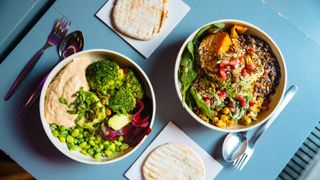
Consume more calories than you burn (positive calorie balance)
Let's say your basal metabolic rate is 1,900 calories: that's the amount of calories your body burns in order to sustain itself. If you move a single muscle a day you will burn more than this amount. Walking to work can burn plenty of calories, not to mention all the other small activities you might do throughout the day.
Let's say you need 3,000 calories a day to put on weight. sounds like a lot, right? One way to tackle this increased calorie intake is to increase food intake frequency and eat 5-6 smaller meals a day as opposed to having three 1,000-calorie meals.
If you are planning on eating five meals a day, meal prep can also come in handy. Ideally, you want to eat food that you cooked/prepared yourself but we admit that might be a bit too much effort for some. Regardless, you should still plan ahead and at least roughly assemble the food you are planning on eating throughout the day tomorrow.
In case you are concerned about putting on loads of fat in the process, a 2017 study found that " an increase in the eating frequency can also be correlated with an increased prevalence of normal BMI individuals provided adequate physical exercise", meaning that eating more frequently could help maintain a normal BMI level.
Ember Biltong – Original Flavour Beef Jerky (10x28g) | Buy it for £19.99 at Amazon
[Per pack] Protein: 16 grams | Fat: 1.3 grams | Sugar: 0.2 grams
The Ember Biltong has virtually no sugar and uses the "best British and Irish beef". Ember claims they "carefully select joints of topside beef ethically sourced from traditional hard-working farms." The Ember Biltong is air dried, which is a slower process and involves less sodium, making this lightly seasoned beef-snack all the more healthier.
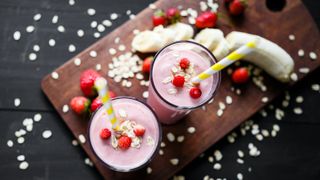
Add more protein and (good) fat to your diet
Carbohydrates are important for muscle building but the other two macronutrients, namely protein and fat, are equally as important when it comes to gaining weight. Fatty food will make you feel sated for longer and food with higher fat content tend to taste better too.
Fatty foods you should include in your diet are oily fish, such as salmon and mackerel, nuts (e.g. Brazil nuts), avocado, butter, heavy/double cream, dark chocolate, olive oil and eggs. Most of these are also high in protein so by eating them, you will be killing two birds with one stone.
Talking about protein: protein is essential for muscle building and recovery and you will need to eat more than you'd think to aid weight gain. According to the International Society of Sports Nutrition, "for building muscle mass and for maintaining muscle mass through a positive muscle protein balance, an overall daily protein intake in the range of 1.4-2.0 g protein/kg body weight/day (g/kg/d) is sufficient for most exercising individuals".
The paper goes on saying that "higher protein intakes (2.3-3.1 g/kg/d) may be needed to maximize the retention of lean body mass in resistance-trained subjects during hypocaloric periods", meaning you will have to up your protein intake once you started increasing muscle mass.
It is advised to have at least 20-30 grams of protein with each meal if the plan is to eat five times a day. Protein should be supplied from a variety of sources including green leafy vegetables, fish, lean meat, eggs etc.
Alternatively, you can also consider supplementing protein and have the best protein powder shakes and the best protein bars / best jerky as snacks throughout the day.
Fitbit Aria Air Smart Scale | But it for £49.99 at Amazon
It might not be the most advanced smart scale on the planet but the Fitbit Aria Air is worth a look for one reason: it's a Fitbit product, meaning it feeds information into the fitbit ecosystem and especially in light of the release of the new Fitbit Sense, the more body metrics you can feed into the Fitbit App, the more accurately you can monitor your wellbeing. Not to mention the Aria Air is not particularly expensive either.

Do resistance training more often
One of the main reasons why you might not be gaining weight and particularly muscle mass is the lack of resistance training. If you are after muscle growth, you need to stimulate that muscle growth by training the muscles often. How often?
A 2016 systematic review and meta-analysis concludes that "the findings indicate a graded dose-response relationship whereby increases in resistance training volume produce greater gains in muscle hypertrophy", meaning, quite simply, that the more you work out, the muscular you will get.
This might sound self-explanatory to some but also contradictory to basic bodybuilding principles, namely that resting is almost as important tas the training itself. Just to reiterate, resting is important but resting muscles doesn't necessarily mean not training at all.
Finding a balance between training as often as possible without injuring yourself is paramount. The type of resistance training is up to you but don't fall into the trap of only tracking calories. Even the best running watches and best heart rate monitors can't track muscle activation and by tracking workouts with them, you can easily end up focusing only on burning calories.
What you want to do is the complete opposite: maxing out of workouts that increase strength but don't burn calories. Sure, you should still do some cardio: it's great for heart health and to maintain/improve the cardiovascular system, but try limiting the duration of cardio and let the bulk of your workout be anaerobic movements.
Check out our muscle building guide to find out more.
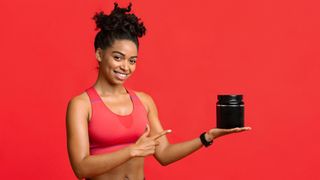
Consider supplements
As well as having the occasional protein shake, if your plan is to bulk up a bit and build functional muscle mass, there are other two supplements you might want to consider taking: mass gainer and creatine.
The best mass gainers have loads of calories in them, yet they come in an easy-to-consume powder form so it's easier to stomach one or two servings a day. Better still, weight gainers are most usually low on fat and sugars, compared to the amount of calories they contain.
Creatine, on the other hand, is the bodybuilding industry's best kept secret. According to Healthline, "studies show that [creatine] can increase muscle mass, strength and exercise performance." In another 12-week study quoted by Healthline in the same article, "in weightlifters, creatine increased muscle fiber growth 2–3 times more than training alone. The increase in total body mass also doubled alongside one-rep max for bench press, a common strength exercise."
Creatine is also cheap and you won't need to take industrial amounts either for it to be effective. 3-5 grams creatine monohydrate a day is enough for most adults.

Ease off cardio
Cardio exercises, such as running or cycling, are great for maintaining fitness and improving heart health. They can help also you improve endurance, general well being and regular cardio can have a positive effect in mood. Also, cardio exercises tend to burn a lot of calories and should you do them for long enough at a time, they can also help you move your bowel easier.
For the same reason, it is advised not to overdo cardio when you are trying to gain weight. Doing some cardio is fine and going for a low effort jog every now and then is a good idea, regardless of your mass gaining efforts. However, avoid doing loads of cardio before or after your resistance training sessions as that will tire muscles out and could hinder bulking up plans.

Matt Kollat is a journalist and content creator who works for T3.com and its magazine counterpart as an Active Editor. His areas of expertise include wearables, drones, fitness equipment, nutrition and outdoor gear. He joined T3 in 2019. His byline appears in several publications, including Techradar and Fit&Well, and more. Matt also collaborated with other content creators (e.g. Garage Gym Reviews) and judged many awards, such as the European Specialist Sports Nutrition Alliance's ESSNawards. When he isn't working out, running or cycling, you'll find him roaming the countryside and trying out new podcasting and content creation equipment.
-
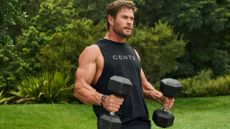 Chris Hemsworth’s personal trainer shares a simple dumbbell workout to build massive arm muscles
Chris Hemsworth’s personal trainer shares a simple dumbbell workout to build massive arm musclesThis six-move workout from Celebrity trainer, Luke Zocchi, will add serious muscle to your biceps and triceps
By Bryony Firth-Bernard Published
-
 Say goodbye to baggage fees – Roka's new collection is the travel hack of the summer
Say goodbye to baggage fees – Roka's new collection is the travel hack of the summerIntroducing the Gatwick collection...
By Lizzie Wilmot Published
